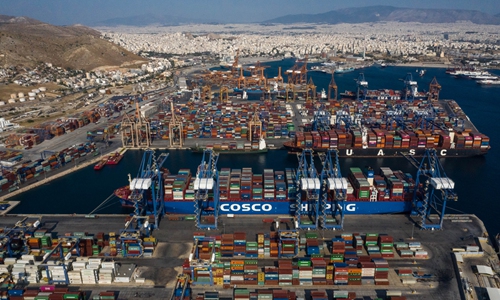HOME >> SOURCE
EU’s ‘unrealistic’ demands hinder BIT, agreement expected to be signed in H1 2021
By Ma Jingjing Source:Global Times Published: 2019/12/18 21:48:41
Agreement expected to be signed in H1 2021

Aerial photo taken on Sept. 6, 2019 shows a cargo ship of COSCO SHIPPING Lines at the Port of Piraeus in Greece. (Photo by Lefteris Partsalis/Xinhua)
China and the EU are expected to reach an agreement on a bilateral investment treaty (BIT) to improve bilateral trade and economic cooperation, but the EU should drop its "unrealistic demands" so as to accelerate the talks and make decisive progress this year, experts said Wednesday.
The comment came after the UK-based Financial Times reported on Tuesday that talks on the BIT are moving at a "snail's pace" and "need more political commitment on the Chinese side," citing Sabine Weyand, the European Commission's director-general for trade.
Indeed, talks on reaching a BIT agreement are moving slowly, experts said, noting that the situation reflects the reality that both sides' attention is partially directed to other issues while the EU is making tougher demands.
"Currently, hindrance to the BIT negotiations mainly comes from the EU, which makes unrealistic demands, such as equal market access, without considering that China is still a developing country where many industries are immature," Cui Hongjian, director of EU Studies at the China Institute of International Studies, told the Global Times on Wednesday.
"A good BIT agreement should be win-win instead of protecting only one side's interests," Cui said, indicating that the EU hopes to reach an "ambitious" agreement to please populist parties within the bloc.
The talks - one of China's most important trade and economic negotiations - started in 2013. The two sides committed to achieve in the course of 2019 the decisive progress required, namely with regard to the liberalization commitments, so as to conclude a comprehensive bilateral investment agreement in 2020, according to a joint statement released in April.
However, while China is entangled in trade tensions with the US, the EU voted in April to resume talks over the Trans-Atlantic Investment Partnership.
This year, the Chinese side repeatedly expressed its willingness to reach the high-level agreement next year.
On Monday, Chinese Foreign Minister Wang Yi called for cooperation between China and the EU for free trade at the European Policy Center in Brussels.
"Apart from a high-quality investment agreement, we should work for an early start of negotiations on a free trade agreement, or at least the launch of feasibility studies on that front," he said.
As China and the EU have been affected by the US' unilateralism and protectionism in different degrees, sticking to opening-up and inclusive cooperation to balance the US should be the two sides' consensus, Cui said, noting that the EU should take an objective stance on technical issues to reach an agreement of mutual benefits.
Zhao Junjie, a research fellow at the Chinese Academy of Social Sciences' Institute of European Studies, told the Global Times that according to the timetable, the two sides are expected to sign the BIT pact in the first half of 2021.
This treaty, if signed, will be a breakthrough in China-EU trade and economic cooperation, Zhao said. "It will release the potential of cooperation between the two sides."
The EU has been China's largest trading partner for 15 years in a row and China has become the EU's second-largest trading partner, according to China's Ministry of Commerce.
Data from the ministry showed that two-way trade between China and the EU hit a record high of $682.2 billion in 2018, an increase of 10.6 percent year-on-year.
Newspaper headline: ‘Unrealistic’ EU demands hinder BIT
Posted in: ECONOMY